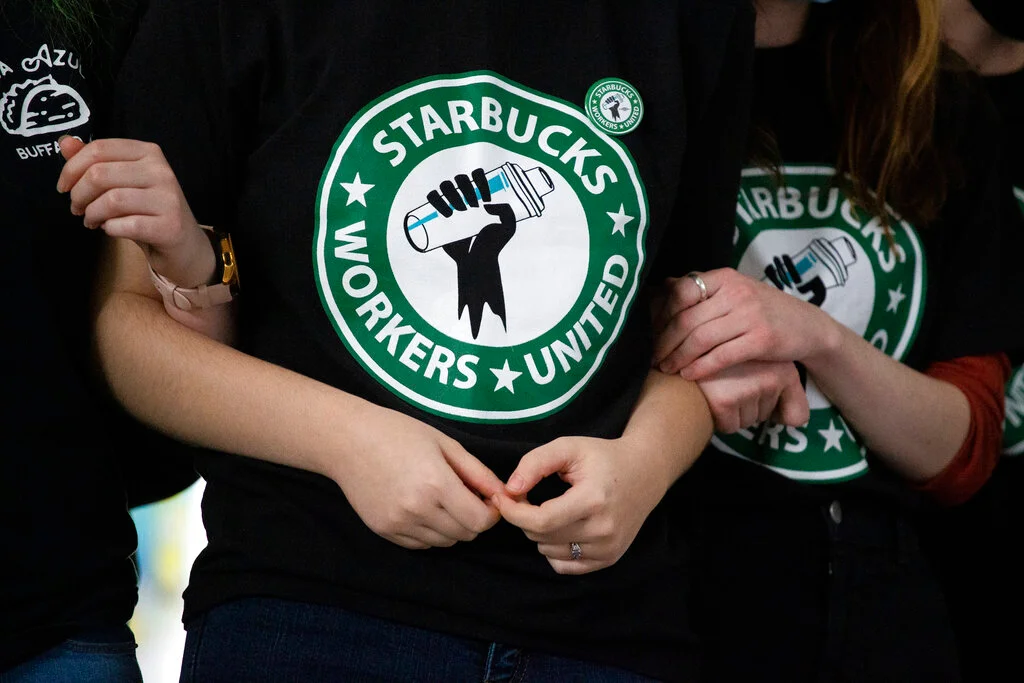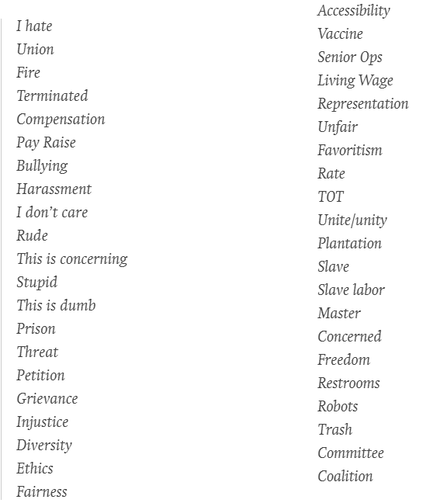|
7/27/2022 Contemporary Union Busting: How Software and the Irrationality of Capitalism Collapsed the Modern Labor Movement. By: Vaughn MitchellRead NowAppleton, Wisconsin Starbucks baristas link arms in solidarity (wearegreenbay.com/news/local-news/partners-have-been-struggling-to-stay-afloat-appleton-starbucks-baristas-unionize/) I had recently finished my Sophomore year of high school when I decided to apply for my first job. There was an opening at Meijer, a popular grocery store found all throughout the Midwest and conveniently in a town bordering my own. Because I had never applied for a job before, I really tried to sell myself on this application, and luckily, I received a call to come in for an interview a couple days later. The position was stocking shelves inside, but I learned in my interview that they don’t allow anyone under 18 to work in the store for safety concerns. What I had thought was a pro-labor move on Meijer’s behalf to protect me from falling items on the shelves and rather spare me for the parking lot that I later found was surrounded by moving cars and blistering 90 degree heat, I was naively satisfied with what would be my new job. I was set to start the next week, late June, and first had to watch some training videos that verified I could work with the utmost indispensable knowledge for the laborious job of cart-pushing. These videos, though, had some caveats. Most significantly, I was strongly encouraged not to join a union: “Before you read any documents pertaining union membership, please understand that they can be filled with deceptive conditions meant to steal your signature that offer little benefits.” Though I don’t work there anymore, I look back on that summer with a grin on my face hearing that all new Meijer employees are automatically registered [1] for membership and represented by the United Food and Commercial Workers Union as of 2022. This was a completely novel strategy that had opened my eyes to modern union busting, and my experience watching those videos at Meijer parallels many other corporations like Walmart, Starbucks, and most infamously, Amazon. A 2018 training guide [2] sent to Whole Foods management, now subsidiaries after being bought out by Amazon, discusses the company’s anti-union sentiments. This mandatory training video explicitly mentions to new employees that "unions pose a threat to this direct connection [between associates and employers]. This commitment to a direct connection with our associates makes union representation unnecessary...we do not believe unions are in the best interest of our customers, our shareholders, or most importantly, our associates." Amazon has also been responsible for airing anti-union advertisements targeting locations that have petitioned the National Labor Relations Board for a vote. Take Bessemer, Alabama, where Amazon's advertisement [3] had led to a failed union vote. Even after the NLRB had authorized another vote after finding these advertisements strongly interfered with Amazon workers’ ability to unionize, the damage had been done, and Bessemer workers had lost the vote a second time [4]. This was nothing unexpected, of course. However, another aspect of this training video presents itself as a laughable and ironic practice for Amazon’s labor policy. Verbatim, "Employee actions in non-union workplaces can be protected...examples would include an employee demanding an increase for all associates or complaining about a work rule that impacts his or her co-workers...associates have the right to discuss their opinions on unions in the workplace at any time." Where’s the irony? Well, a report [5] from The Intercept in April 2022 discusses Amazon’s plans to create an internal chatting service called “Shout-Out” that allows employees to recognize each other for good performance. This program would award “virtual stars” and “badges” for productivity, essentially another way of obfuscating the role of the wage in the worker’s life by replacing an unnecessary reward system that negates the need for pay raises. With this program, instead of compensating for higher productivity, you are acknowledged for it – the chief reason for anticipated resentment to this program. Consequently, this meeting also examined filtering language included in worker’s messages often negatively directed at management. Although a limitation on profanity can be necessary for some phrases on this chatting software, a list of flagged keywords compiled by The Intercept go above and beyond foul language. The lines between profanity limits and deliberate censorship on organization become blurred. The contradiction of Amazon’s simultaneous allowing non-unionized workers to discuss working conditions as recognized in their training video and blacklisting of words such as “compensation”, “pay raise”, “concerning”, “petition”, “living wage”, among others, speak to Amazon’s wavering neutrality and denigration of labor organization. While programs and applications like Amazon’s “Shout-Out” can contribute to the breakage of solidarity before workers can even get the chance to organize, another frequently underestimated factor that grips the modern labor movement by its feet is capitalism’s endless pursuit of profit. Simply put, large corporations find it more profitable to abandon sectors of their provided services or even locations of operation altogether if the threat of unionization exists. One example of the prior occurred in 2000 when Walmart meat-cutters successfully won a union vote in Jacksonville, Texas. Shortly after the vote, Walmart announced [6] a full transition from freshly-cut meat to packaged meat only. These butcherers, like Meijer employees as of 2022, were also represented by the United Food and Commercial Workers Union until the positions were removed by Walmart. Walmart repudiated these union benefits by abolishing the positions set to receive them. Perhaps a more recent example of the latter - abandoning locations of operation - has occurred with Starbucks. This coffee and cake-pop business has recently energized employees in union surges across the country, and Starbucks Workers United (SWU) has influenced more than 180 stores to unionize so far. Just like Walmart decided to obstruct union membership of butcherers in 2000, CEO of Starbucks Howard Schultz follows the same pattern today, declaring that 16 Starbucks locations are set to close due to community-related incidents that hinder the operation of each location. He cites in a video [7] released on July 13th that the closures result from violence and crime near the communities the Starbucks’ are placed in and frequent drug use that occurs in Starbucks bathrooms. A mere recognition that these locations are closing does not suffice. SWU notes "Every decision Starbucks makes must be viewed through the lens of the company's unprecedented and virulent union-busting campaign.” [8] Although Schultz clarifies that the company will not be closing locations that “aren’t unprofitable”, it’s no coincidence that 2 of the 16 Starbucks locations set for closure are already unionized, and another one is set for a vote this August. The precise difference between Starbucks’ and Walmart’s union busting strategies is that Starbucks has taken a thinly veiled anti-union position by justifying their closures with the disruptions in the workplace that the surrounding communities cause; on the other hand, Walmart blatantly disrupted union membership by slashing the need for the meat-cutters’ branch entirely. Both union busting practices of Walmart and Starbucks serve to develop the irrationality of capitalism. This irrationality and inherent contradiction of the traditional capitalist enterprise lies in Walmart and Starbucks halting their productive forces, whether it be workers like the butcherers of Walmart or entire locations like the 16 Starbucks spots (of which those workers also live in precarious situations and will likely be jobless if not relocated). A system designed for the purpose of profit and profit only has molded itself into a new form as a means to preserve its share of the yield even at the expense of workers who fight tirelessly for a fraction more. Admittedly, examining individual events like these can appear minuscule in the entire context of the modern labor movement. Sure, the optimistic left may say “It’s just one union that was busted, worker solidarity is strong elsewhere!” Though pessimism is not optimal either, that does not preclude the ability to remain wary. Although a Gallup poll [9] conducted in September 2021 found that 68% of Americans support labor unions, private sector union membership has been steadily declining since the rise of neoliberalism that has demonstrably impacted the strength of organization. According to the Bureau of Labor Statistics, that figure [10] of unionized Americans stands at 10.3% as of 2021. It goes without saying that Walmart’s abolition of unionized positions in 2000, Starbucks’ closing of unionized locations most recently, Amazon’s condemnation of a unionized workplace through their training videos, advertisements, and software designed to break the bonds of worker solidarity, and more personally, Meijer’s anti-union training procedures all function as pillars that bolster the hierarchical relations that characterize capitalism. So, yes, every union vote counts whether you’re a well-to-do Starbucks barista in college making some extra cash or a single mother of 2 children working at Bessemer’s Amazon facility. Having seen coworkers all across the spectrum, the common denominator is that we are all replaceable cogs in the machine. And although it sounds trite, unions offer strength in numbers that is unparalleled to any downsizing, any piece of technology, any advertisement, or any capitalist function that serves to suppress the power of organized labor. Solidarity to all who produce. Works Cited: [1] Thomas, Marques. “Is Meijer Unionized in 2022? (All You Need to Know).” QuerySprout, 4 Apr. 2022, https://querysprout.com/is-meijer-unionized/. [2] “Amazon's Union-Busting Training Video (Long Version).” YouTube, 22 June 2019, https://youtu.be/uRpwVwFxyk4. [3] “Amazon Is Running This Anti-Union AD to Combat Organizing Efforts.” YouTube, 23 Feb. 2021, https://youtu.be/Pp76Bp0jGOE. [4] Palmer, Annie. “Amazon Workers in Alabama Reject Union for Second Time, but Challenged Ballots Remain.” CNBC, CNBC, 31 Mar. 2022, https://www.cnbc.com/2022/03/31/amazon-workers-in-alabama-reject-union-for-second-time.html [5] Klippenstein, Ken. “Leaked: New Amazon Worker Chat App Would Ban Words like ‘Union," ‘Restrooms," ‘Pay Raise," and ‘Plantation.’” The Intercept, The Intercept, 4 Apr. 2022, https://theintercept.com/2022/04/04/amazon-union-living-wage-restrooms-chat-app/. [6] Swoboda, Frank. “Wal-Mart Ends Meat-Cutting Jobs.” The Washington Post, WP Company, 4 Mar. 2000, https://www.washingtonpost.com/archive/business/2000/03/04/wal-mart-ends-meat-cutting-jobs/acdb8f7c-d7c2-4e31-aad7-8f690ba3b35b/. [7] Hoffman, Ari. “Howard Schultz on Closing 16 Starbucks Locations.” Twitter, Twitter, 13 July 2022, https://twitter.com/thehoffather/status/1547308330929963008?ref_src=twsrc%5Etfw%7Ctwcamp%5Etweetembed%7Ctwterm%5E1547308376765263872%7Ctwgr%5E%7Ctwcon%5Es2_&ref_url=https%3A%2F%2Fnypost.com%2F2022%2F07%2F18%2Fstarbucks-ceo-howard-schultz-blames-democrat-run-cities-for-store-closures%2F. [8] Corrigan, John. “Starbucks to Close Even More Stores.” HRD America, HRD America, 19 July 2022, https://www.hcamag.com/us/specialization/industrial-relations/starbucks-to-close-even-more-stores/413713. [9] Brenan, Megan. “Approval of Labor Unions at Highest Point since 1965.” Gallup.com, Gallup, 20 Nov. 2021, https://news.gallup.com/poll/354455/approval-labor-unions-highest-point-1965.aspx. [10] United States Bureau of Labor Statistics. “Union Members-2021” News Release, U.S. Department of Labor, 20 Jan. 2022, https://www.bls.gov/news.release/pdf/union2.pdf AuthorVaughn Mitchell is a high school senior living outside Chicago. His political interests include the development and origins of labor unions, abolition movements in the 20th century, and the Land Back movement. After his final year of high school, he hopes to study data science and political science on the East Coast. Archives July 2022
0 Comments
Leave a Reply. |
Details
AuthorWrite something about yourself. No need to be fancy, just an overview. Archives
February 2023
Categories
All
About the Midwestern Marx Youth LeagueThe Midwestern Marx Youth League (MMYL) was created to allow comrades in undergraduate or below to publish their work as they continue to develop both writing skills and knowledge of socialist and communist studies. Due to our unexpected popularity on Tik Tok, many young authors have approached us hoping to publish their work. We believe the most productive way to use this platform in a youth inclusive manner would be to form the youth league. This will give our young writers a platform to develop their writing and to discuss theory, history, and campus organizational affairs. The youth league will also be working with the editorial board to ensure theoretical development. If you are interested in joining the youth league please visit the submissions section for more information on how to contact us!
|



 RSS Feed
RSS Feed